Qualitative Study: Young People and Rough Sleeping in London - Report
VerifiedAdded on 2022/08/26
|11
|2427
|27
Report
AI Summary
This report presents a qualitative study on young people and rough sleeping in London, based on two interview transcripts. The study explores the experiences of two individuals, Luke and Gemma, focusing on the themes of unemployment, social exclusion, and health issues. The report examines the impact of these factors on the lives of young people experiencing homelessness, drawing on socio-cultural theories and relevant policy. Findings reveal the interplay of individual and structural factors contributing to rough sleeping, including lack of education, criminal records, family detachment, emotional trauma, substance abuse, and limited access to healthcare. The study highlights the significance of social support, access to opportunities, and mental health services in addressing the challenges faced by young people experiencing homelessness and concludes with recommendations for improving the situation.
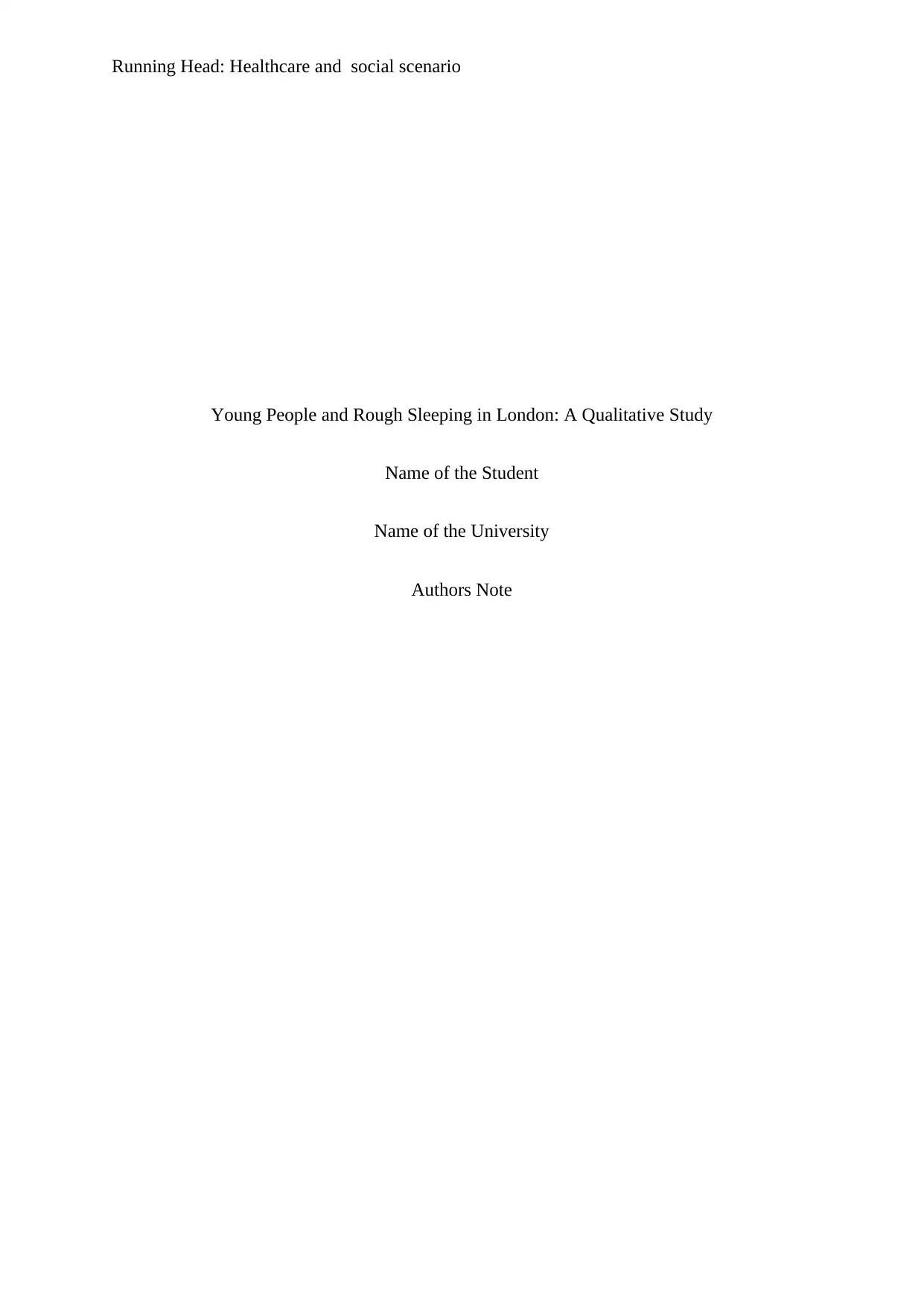
Running Head: Healthcare and social scenario
Young People and Rough Sleeping in London: A Qualitative Study
Name of the Student
Name of the University
Authors Note
Young People and Rough Sleeping in London: A Qualitative Study
Name of the Student
Name of the University
Authors Note
Paraphrase This Document
Need a fresh take? Get an instant paraphrase of this document with our AI Paraphraser
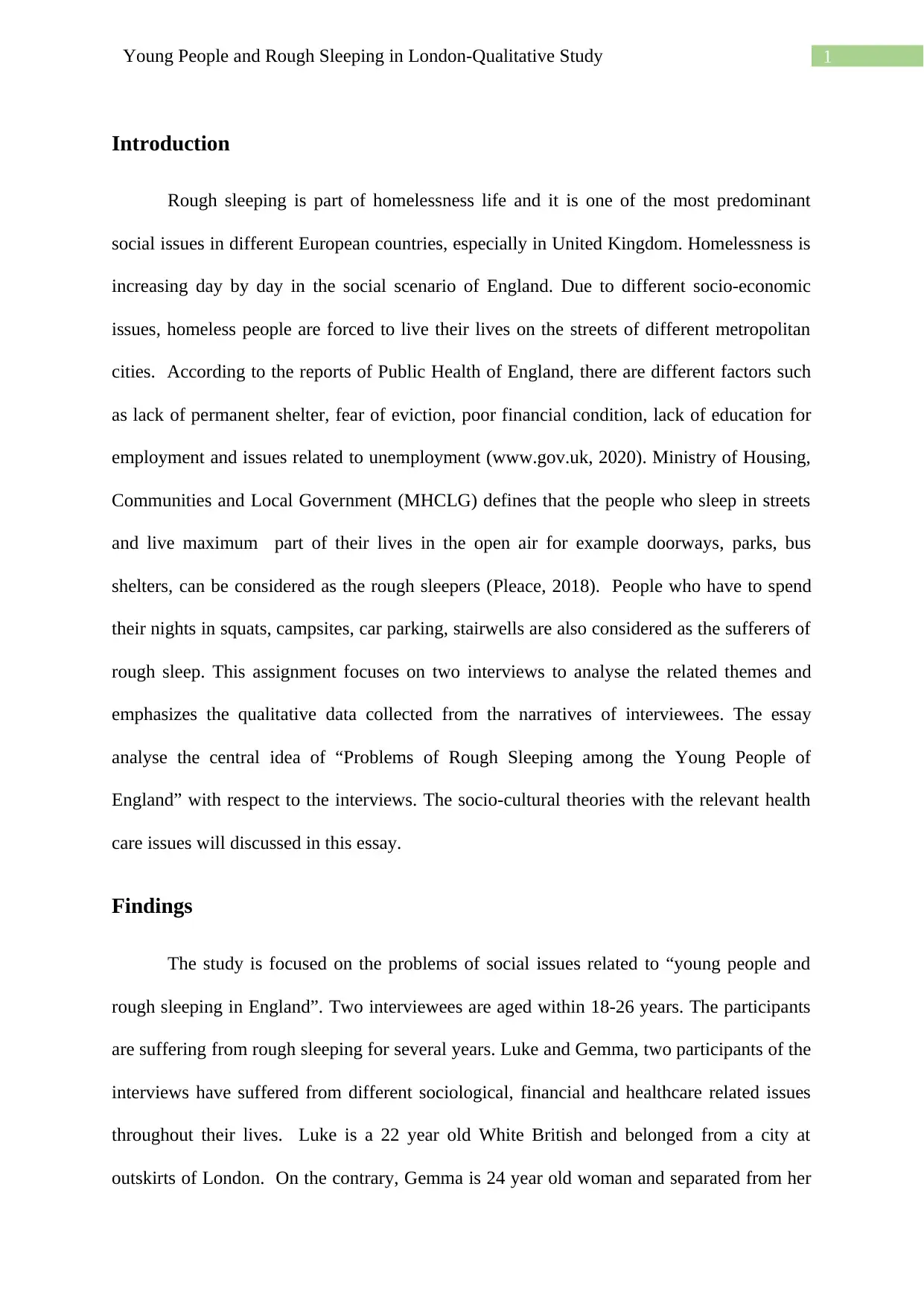
1Young People and Rough Sleeping in London-Qualitative Study
Introduction
Rough sleeping is part of homelessness life and it is one of the most predominant
social issues in different European countries, especially in United Kingdom. Homelessness is
increasing day by day in the social scenario of England. Due to different socio-economic
issues, homeless people are forced to live their lives on the streets of different metropolitan
cities. According to the reports of Public Health of England, there are different factors such
as lack of permanent shelter, fear of eviction, poor financial condition, lack of education for
employment and issues related to unemployment (www.gov.uk, 2020). Ministry of Housing,
Communities and Local Government (MHCLG) defines that the people who sleep in streets
and live maximum part of their lives in the open air for example doorways, parks, bus
shelters, can be considered as the rough sleepers (Pleace, 2018). People who have to spend
their nights in squats, campsites, car parking, stairwells are also considered as the sufferers of
rough sleep. This assignment focuses on two interviews to analyse the related themes and
emphasizes the qualitative data collected from the narratives of interviewees. The essay
analyse the central idea of “Problems of Rough Sleeping among the Young People of
England” with respect to the interviews. The socio-cultural theories with the relevant health
care issues will discussed in this essay.
Findings
The study is focused on the problems of social issues related to “young people and
rough sleeping in England”. Two interviewees are aged within 18-26 years. The participants
are suffering from rough sleeping for several years. Luke and Gemma, two participants of the
interviews have suffered from different sociological, financial and healthcare related issues
throughout their lives. Luke is a 22 year old White British and belonged from a city at
outskirts of London. On the contrary, Gemma is 24 year old woman and separated from her
Introduction
Rough sleeping is part of homelessness life and it is one of the most predominant
social issues in different European countries, especially in United Kingdom. Homelessness is
increasing day by day in the social scenario of England. Due to different socio-economic
issues, homeless people are forced to live their lives on the streets of different metropolitan
cities. According to the reports of Public Health of England, there are different factors such
as lack of permanent shelter, fear of eviction, poor financial condition, lack of education for
employment and issues related to unemployment (www.gov.uk, 2020). Ministry of Housing,
Communities and Local Government (MHCLG) defines that the people who sleep in streets
and live maximum part of their lives in the open air for example doorways, parks, bus
shelters, can be considered as the rough sleepers (Pleace, 2018). People who have to spend
their nights in squats, campsites, car parking, stairwells are also considered as the sufferers of
rough sleep. This assignment focuses on two interviews to analyse the related themes and
emphasizes the qualitative data collected from the narratives of interviewees. The essay
analyse the central idea of “Problems of Rough Sleeping among the Young People of
England” with respect to the interviews. The socio-cultural theories with the relevant health
care issues will discussed in this essay.
Findings
The study is focused on the problems of social issues related to “young people and
rough sleeping in England”. Two interviewees are aged within 18-26 years. The participants
are suffering from rough sleeping for several years. Luke and Gemma, two participants of the
interviews have suffered from different sociological, financial and healthcare related issues
throughout their lives. Luke is a 22 year old White British and belonged from a city at
outskirts of London. On the contrary, Gemma is 24 year old woman and separated from her
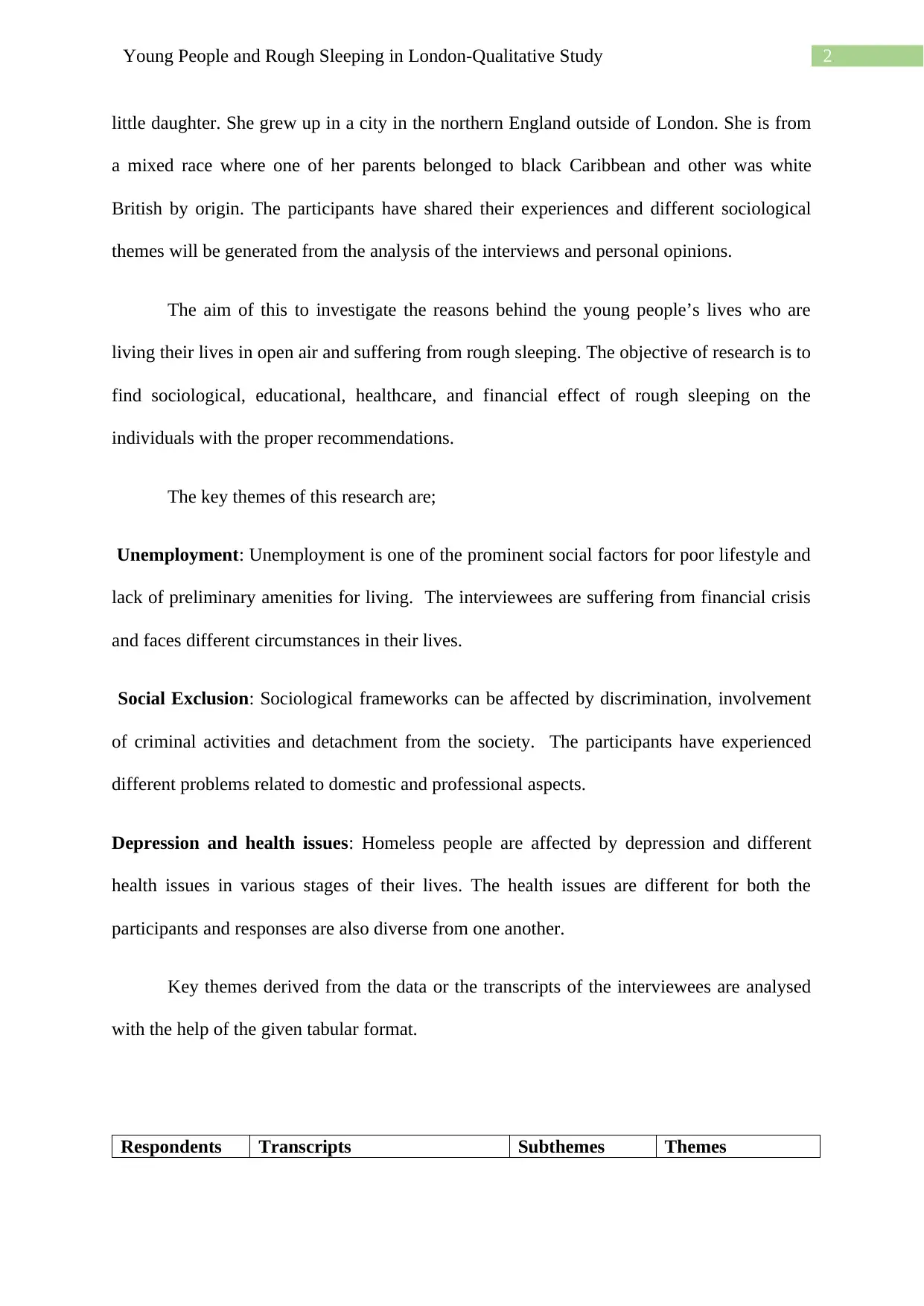
2Young People and Rough Sleeping in London-Qualitative Study
little daughter. She grew up in a city in the northern England outside of London. She is from
a mixed race where one of her parents belonged to black Caribbean and other was white
British by origin. The participants have shared their experiences and different sociological
themes will be generated from the analysis of the interviews and personal opinions.
The aim of this to investigate the reasons behind the young people’s lives who are
living their lives in open air and suffering from rough sleeping. The objective of research is to
find sociological, educational, healthcare, and financial effect of rough sleeping on the
individuals with the proper recommendations.
The key themes of this research are;
Unemployment: Unemployment is one of the prominent social factors for poor lifestyle and
lack of preliminary amenities for living. The interviewees are suffering from financial crisis
and faces different circumstances in their lives.
Social Exclusion: Sociological frameworks can be affected by discrimination, involvement
of criminal activities and detachment from the society. The participants have experienced
different problems related to domestic and professional aspects.
Depression and health issues: Homeless people are affected by depression and different
health issues in various stages of their lives. The health issues are different for both the
participants and responses are also diverse from one another.
Key themes derived from the data or the transcripts of the interviewees are analysed
with the help of the given tabular format.
Respondents Transcripts Subthemes Themes
little daughter. She grew up in a city in the northern England outside of London. She is from
a mixed race where one of her parents belonged to black Caribbean and other was white
British by origin. The participants have shared their experiences and different sociological
themes will be generated from the analysis of the interviews and personal opinions.
The aim of this to investigate the reasons behind the young people’s lives who are
living their lives in open air and suffering from rough sleeping. The objective of research is to
find sociological, educational, healthcare, and financial effect of rough sleeping on the
individuals with the proper recommendations.
The key themes of this research are;
Unemployment: Unemployment is one of the prominent social factors for poor lifestyle and
lack of preliminary amenities for living. The interviewees are suffering from financial crisis
and faces different circumstances in their lives.
Social Exclusion: Sociological frameworks can be affected by discrimination, involvement
of criminal activities and detachment from the society. The participants have experienced
different problems related to domestic and professional aspects.
Depression and health issues: Homeless people are affected by depression and different
health issues in various stages of their lives. The health issues are different for both the
participants and responses are also diverse from one another.
Key themes derived from the data or the transcripts of the interviewees are analysed
with the help of the given tabular format.
Respondents Transcripts Subthemes Themes
⊘ This is a preview!⊘
Do you want full access?
Subscribe today to unlock all pages.

Trusted by 1+ million students worldwide
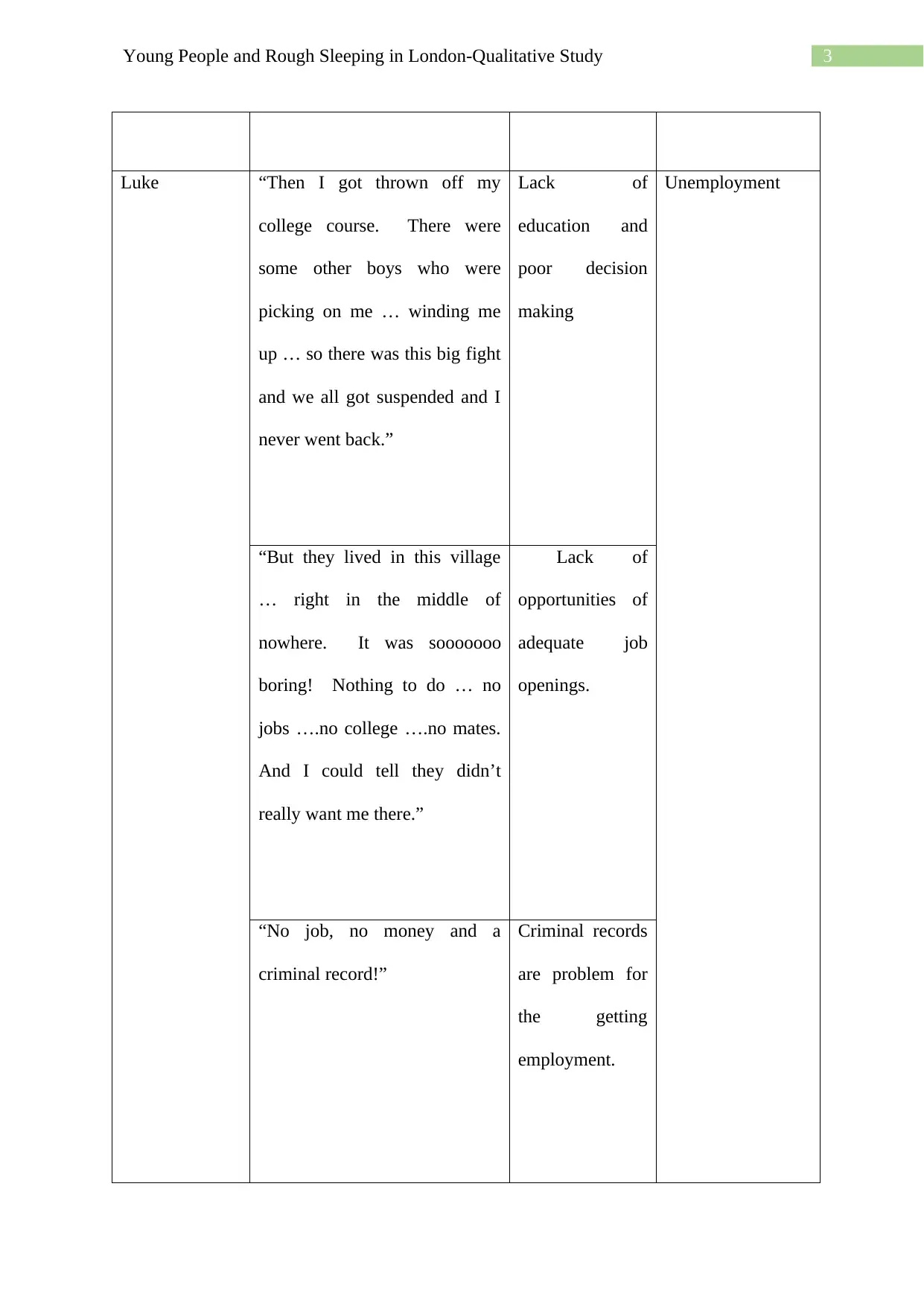
3Young People and Rough Sleeping in London-Qualitative Study
Luke “Then I got thrown off my
college course. There were
some other boys who were
picking on me … winding me
up … so there was this big fight
and we all got suspended and I
never went back.”
Lack of
education and
poor decision
making
Unemployment
“But they lived in this village
… right in the middle of
nowhere. It was sooooooo
boring! Nothing to do … no
jobs ….no college ….no mates.
And I could tell they didn’t
really want me there.”
Lack of
opportunities of
adequate job
openings.
“No job, no money and a
criminal record!”
Criminal records
are problem for
the getting
employment.
Luke “Then I got thrown off my
college course. There were
some other boys who were
picking on me … winding me
up … so there was this big fight
and we all got suspended and I
never went back.”
Lack of
education and
poor decision
making
Unemployment
“But they lived in this village
… right in the middle of
nowhere. It was sooooooo
boring! Nothing to do … no
jobs ….no college ….no mates.
And I could tell they didn’t
really want me there.”
Lack of
opportunities of
adequate job
openings.
“No job, no money and a
criminal record!”
Criminal records
are problem for
the getting
employment.
Paraphrase This Document
Need a fresh take? Get an instant paraphrase of this document with our AI Paraphraser
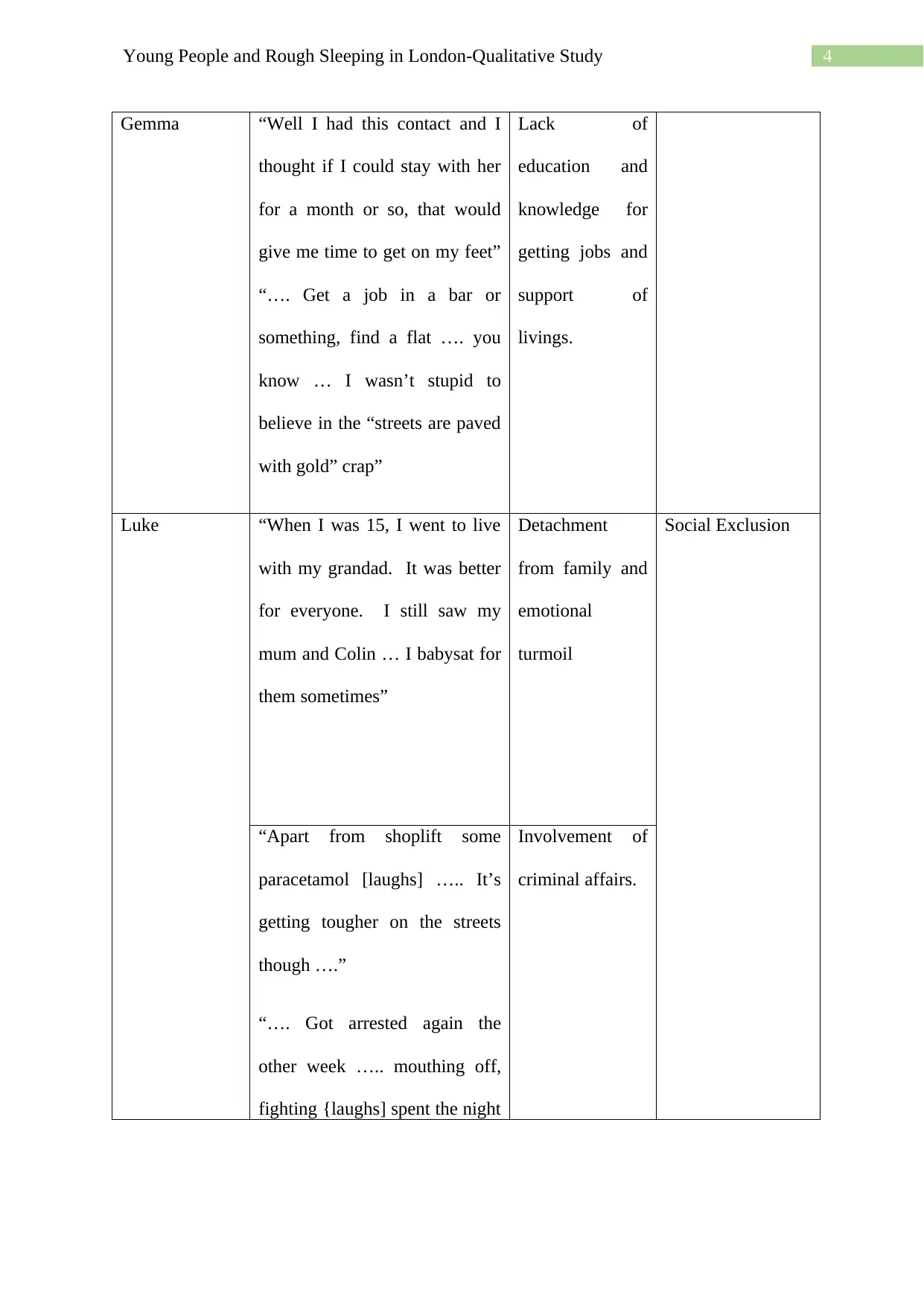
4Young People and Rough Sleeping in London-Qualitative Study
Gemma “Well I had this contact and I
thought if I could stay with her
for a month or so, that would
give me time to get on my feet”
“…. Get a job in a bar or
something, find a flat …. you
know … I wasn’t stupid to
believe in the “streets are paved
with gold” crap”
Lack of
education and
knowledge for
getting jobs and
support of
livings.
Luke “When I was 15, I went to live
with my grandad. It was better
for everyone. I still saw my
mum and Colin … I babysat for
them sometimes”
Detachment
from family and
emotional
turmoil
Social Exclusion
“Apart from shoplift some
paracetamol [laughs] ….. It’s
getting tougher on the streets
though ….”
“…. Got arrested again the
other week ….. mouthing off,
fighting {laughs] spent the night
Involvement of
criminal affairs.
Gemma “Well I had this contact and I
thought if I could stay with her
for a month or so, that would
give me time to get on my feet”
“…. Get a job in a bar or
something, find a flat …. you
know … I wasn’t stupid to
believe in the “streets are paved
with gold” crap”
Lack of
education and
knowledge for
getting jobs and
support of
livings.
Luke “When I was 15, I went to live
with my grandad. It was better
for everyone. I still saw my
mum and Colin … I babysat for
them sometimes”
Detachment
from family and
emotional
turmoil
Social Exclusion
“Apart from shoplift some
paracetamol [laughs] ….. It’s
getting tougher on the streets
though ….”
“…. Got arrested again the
other week ….. mouthing off,
fighting {laughs] spent the night
Involvement of
criminal affairs.
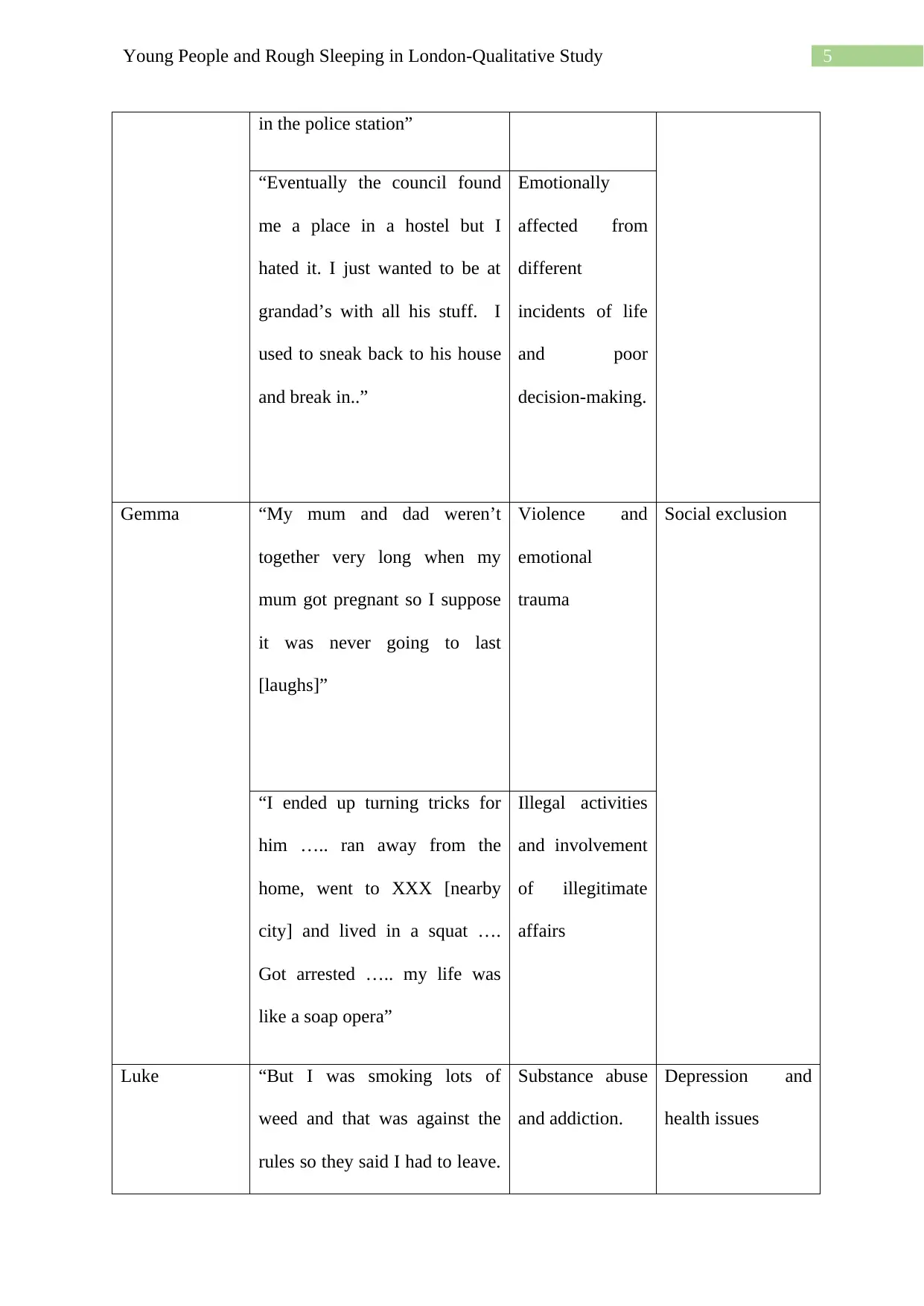
5Young People and Rough Sleeping in London-Qualitative Study
in the police station”
“Eventually the council found
me a place in a hostel but I
hated it. I just wanted to be at
grandad’s with all his stuff. I
used to sneak back to his house
and break in..”
Emotionally
affected from
different
incidents of life
and poor
decision-making.
Gemma “My mum and dad weren’t
together very long when my
mum got pregnant so I suppose
it was never going to last
[laughs]”
Violence and
emotional
trauma
Social exclusion
“I ended up turning tricks for
him ….. ran away from the
home, went to XXX [nearby
city] and lived in a squat ….
Got arrested ….. my life was
like a soap opera”
Illegal activities
and involvement
of illegitimate
affairs
Luke “But I was smoking lots of
weed and that was against the
rules so they said I had to leave.
Substance abuse
and addiction.
Depression and
health issues
in the police station”
“Eventually the council found
me a place in a hostel but I
hated it. I just wanted to be at
grandad’s with all his stuff. I
used to sneak back to his house
and break in..”
Emotionally
affected from
different
incidents of life
and poor
decision-making.
Gemma “My mum and dad weren’t
together very long when my
mum got pregnant so I suppose
it was never going to last
[laughs]”
Violence and
emotional
trauma
Social exclusion
“I ended up turning tricks for
him ….. ran away from the
home, went to XXX [nearby
city] and lived in a squat ….
Got arrested ….. my life was
like a soap opera”
Illegal activities
and involvement
of illegitimate
affairs
Luke “But I was smoking lots of
weed and that was against the
rules so they said I had to leave.
Substance abuse
and addiction.
Depression and
health issues
⊘ This is a preview!⊘
Do you want full access?
Subscribe today to unlock all pages.

Trusted by 1+ million students worldwide
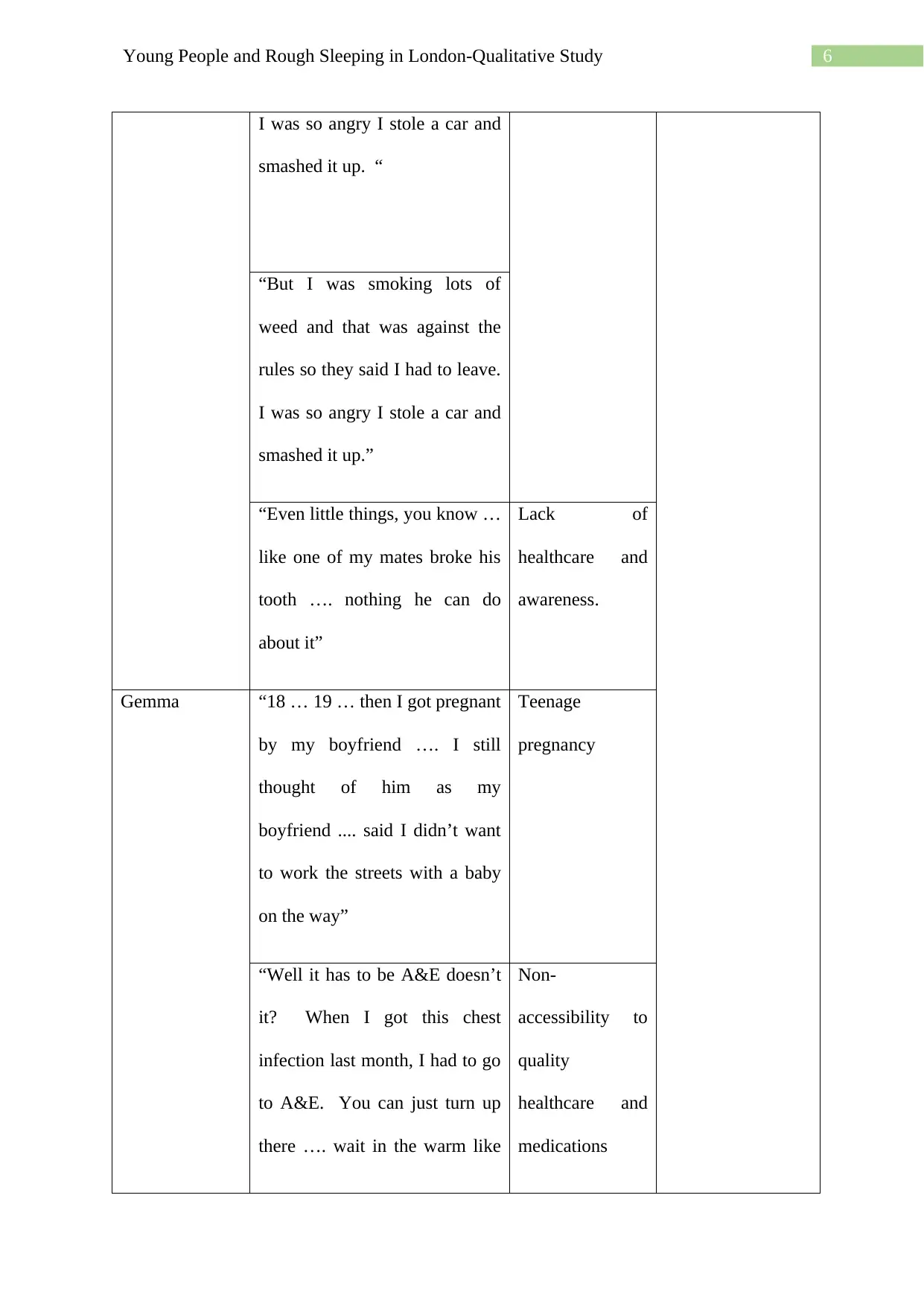
6Young People and Rough Sleeping in London-Qualitative Study
I was so angry I stole a car and
smashed it up. “
“But I was smoking lots of
weed and that was against the
rules so they said I had to leave.
I was so angry I stole a car and
smashed it up.”
“Even little things, you know …
like one of my mates broke his
tooth …. nothing he can do
about it”
Lack of
healthcare and
awareness.
Gemma “18 … 19 … then I got pregnant
by my boyfriend …. I still
thought of him as my
boyfriend .... said I didn’t want
to work the streets with a baby
on the way”
Teenage
pregnancy
“Well it has to be A&E doesn’t
it? When I got this chest
infection last month, I had to go
to A&E. You can just turn up
there …. wait in the warm like
Non-
accessibility to
quality
healthcare and
medications
I was so angry I stole a car and
smashed it up. “
“But I was smoking lots of
weed and that was against the
rules so they said I had to leave.
I was so angry I stole a car and
smashed it up.”
“Even little things, you know …
like one of my mates broke his
tooth …. nothing he can do
about it”
Lack of
healthcare and
awareness.
Gemma “18 … 19 … then I got pregnant
by my boyfriend …. I still
thought of him as my
boyfriend .... said I didn’t want
to work the streets with a baby
on the way”
Teenage
pregnancy
“Well it has to be A&E doesn’t
it? When I got this chest
infection last month, I had to go
to A&E. You can just turn up
there …. wait in the warm like
Non-
accessibility to
quality
healthcare and
medications
Paraphrase This Document
Need a fresh take? Get an instant paraphrase of this document with our AI Paraphraser
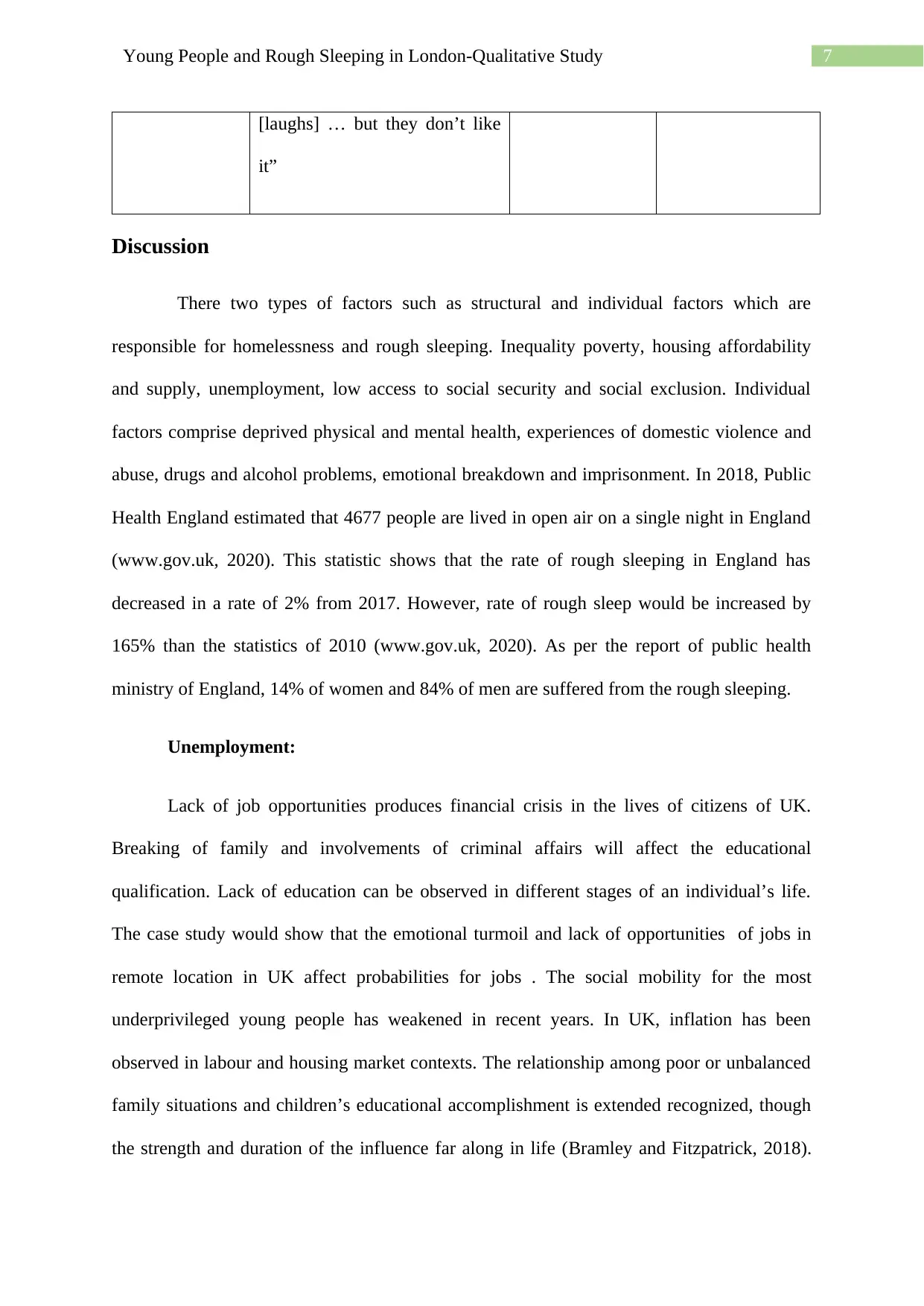
7Young People and Rough Sleeping in London-Qualitative Study
[laughs] … but they don’t like
it”
Discussion
There two types of factors such as structural and individual factors which are
responsible for homelessness and rough sleeping. Inequality poverty, housing affordability
and supply, unemployment, low access to social security and social exclusion. Individual
factors comprise deprived physical and mental health, experiences of domestic violence and
abuse, drugs and alcohol problems, emotional breakdown and imprisonment. In 2018, Public
Health England estimated that 4677 people are lived in open air on a single night in England
(www.gov.uk, 2020). This statistic shows that the rate of rough sleeping in England has
decreased in a rate of 2% from 2017. However, rate of rough sleep would be increased by
165% than the statistics of 2010 (www.gov.uk, 2020). As per the report of public health
ministry of England, 14% of women and 84% of men are suffered from the rough sleeping.
Unemployment:
Lack of job opportunities produces financial crisis in the lives of citizens of UK.
Breaking of family and involvements of criminal affairs will affect the educational
qualification. Lack of education can be observed in different stages of an individual’s life.
The case study would show that the emotional turmoil and lack of opportunities of jobs in
remote location in UK affect probabilities for jobs . The social mobility for the most
underprivileged young people has weakened in recent years. In UK, inflation has been
observed in labour and housing market contexts. The relationship among poor or unbalanced
family situations and children’s educational accomplishment is extended recognized, though
the strength and duration of the influence far along in life (Bramley and Fitzpatrick, 2018).
[laughs] … but they don’t like
it”
Discussion
There two types of factors such as structural and individual factors which are
responsible for homelessness and rough sleeping. Inequality poverty, housing affordability
and supply, unemployment, low access to social security and social exclusion. Individual
factors comprise deprived physical and mental health, experiences of domestic violence and
abuse, drugs and alcohol problems, emotional breakdown and imprisonment. In 2018, Public
Health England estimated that 4677 people are lived in open air on a single night in England
(www.gov.uk, 2020). This statistic shows that the rate of rough sleeping in England has
decreased in a rate of 2% from 2017. However, rate of rough sleep would be increased by
165% than the statistics of 2010 (www.gov.uk, 2020). As per the report of public health
ministry of England, 14% of women and 84% of men are suffered from the rough sleeping.
Unemployment:
Lack of job opportunities produces financial crisis in the lives of citizens of UK.
Breaking of family and involvements of criminal affairs will affect the educational
qualification. Lack of education can be observed in different stages of an individual’s life.
The case study would show that the emotional turmoil and lack of opportunities of jobs in
remote location in UK affect probabilities for jobs . The social mobility for the most
underprivileged young people has weakened in recent years. In UK, inflation has been
observed in labour and housing market contexts. The relationship among poor or unbalanced
family situations and children’s educational accomplishment is extended recognized, though
the strength and duration of the influence far along in life (Bramley and Fitzpatrick, 2018).
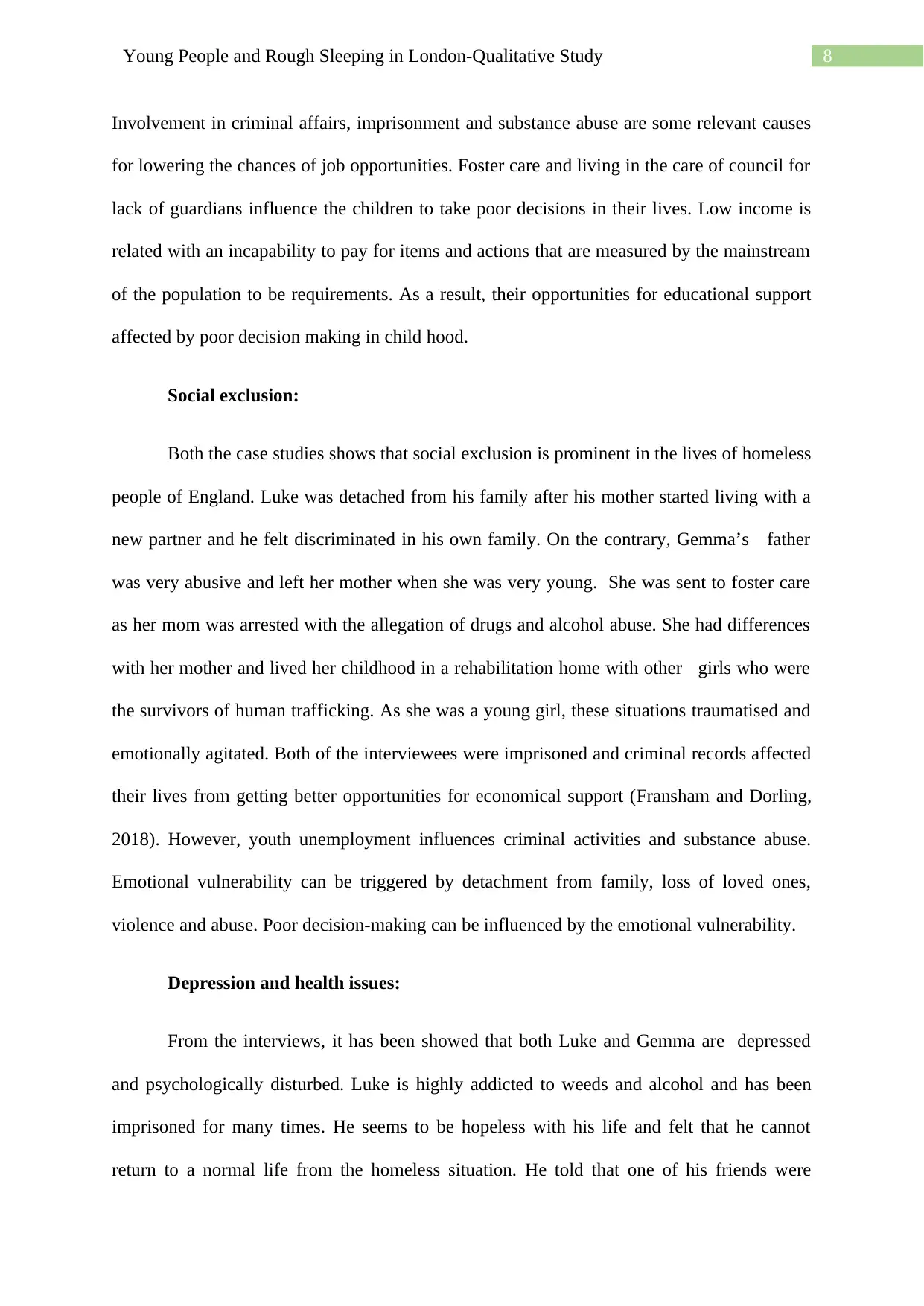
8Young People and Rough Sleeping in London-Qualitative Study
Involvement in criminal affairs, imprisonment and substance abuse are some relevant causes
for lowering the chances of job opportunities. Foster care and living in the care of council for
lack of guardians influence the children to take poor decisions in their lives. Low income is
related with an incapability to pay for items and actions that are measured by the mainstream
of the population to be requirements. As a result, their opportunities for educational support
affected by poor decision making in child hood.
Social exclusion:
Both the case studies shows that social exclusion is prominent in the lives of homeless
people of England. Luke was detached from his family after his mother started living with a
new partner and he felt discriminated in his own family. On the contrary, Gemma’s father
was very abusive and left her mother when she was very young. She was sent to foster care
as her mom was arrested with the allegation of drugs and alcohol abuse. She had differences
with her mother and lived her childhood in a rehabilitation home with other girls who were
the survivors of human trafficking. As she was a young girl, these situations traumatised and
emotionally agitated. Both of the interviewees were imprisoned and criminal records affected
their lives from getting better opportunities for economical support (Fransham and Dorling,
2018). However, youth unemployment influences criminal activities and substance abuse.
Emotional vulnerability can be triggered by detachment from family, loss of loved ones,
violence and abuse. Poor decision-making can be influenced by the emotional vulnerability.
Depression and health issues:
From the interviews, it has been showed that both Luke and Gemma are depressed
and psychologically disturbed. Luke is highly addicted to weeds and alcohol and has been
imprisoned for many times. He seems to be hopeless with his life and felt that he cannot
return to a normal life from the homeless situation. He told that one of his friends were
Involvement in criminal affairs, imprisonment and substance abuse are some relevant causes
for lowering the chances of job opportunities. Foster care and living in the care of council for
lack of guardians influence the children to take poor decisions in their lives. Low income is
related with an incapability to pay for items and actions that are measured by the mainstream
of the population to be requirements. As a result, their opportunities for educational support
affected by poor decision making in child hood.
Social exclusion:
Both the case studies shows that social exclusion is prominent in the lives of homeless
people of England. Luke was detached from his family after his mother started living with a
new partner and he felt discriminated in his own family. On the contrary, Gemma’s father
was very abusive and left her mother when she was very young. She was sent to foster care
as her mom was arrested with the allegation of drugs and alcohol abuse. She had differences
with her mother and lived her childhood in a rehabilitation home with other girls who were
the survivors of human trafficking. As she was a young girl, these situations traumatised and
emotionally agitated. Both of the interviewees were imprisoned and criminal records affected
their lives from getting better opportunities for economical support (Fransham and Dorling,
2018). However, youth unemployment influences criminal activities and substance abuse.
Emotional vulnerability can be triggered by detachment from family, loss of loved ones,
violence and abuse. Poor decision-making can be influenced by the emotional vulnerability.
Depression and health issues:
From the interviews, it has been showed that both Luke and Gemma are depressed
and psychologically disturbed. Luke is highly addicted to weeds and alcohol and has been
imprisoned for many times. He seems to be hopeless with his life and felt that he cannot
return to a normal life from the homeless situation. He told that one of his friends were
⊘ This is a preview!⊘
Do you want full access?
Subscribe today to unlock all pages.

Trusted by 1+ million students worldwide
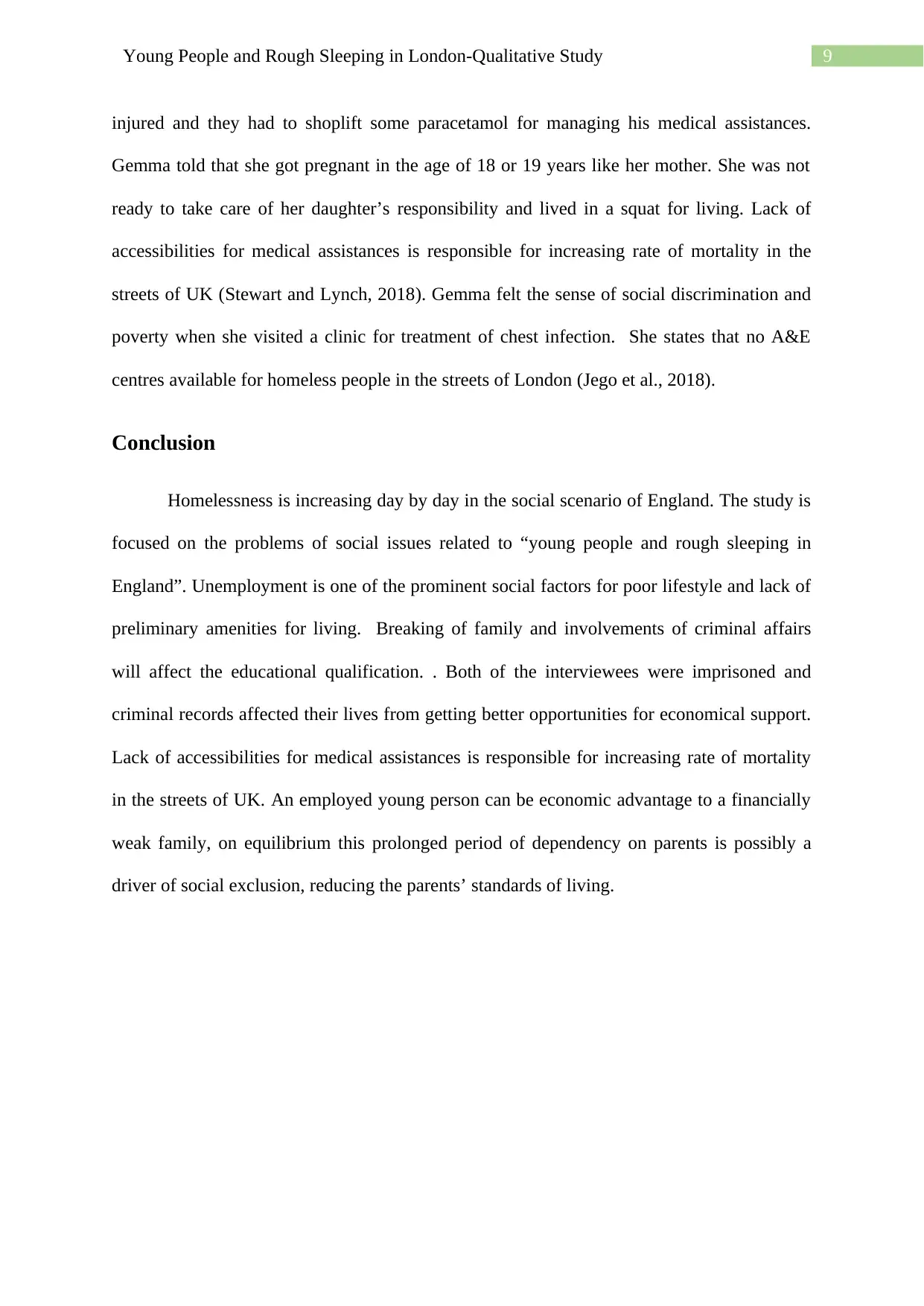
9Young People and Rough Sleeping in London-Qualitative Study
injured and they had to shoplift some paracetamol for managing his medical assistances.
Gemma told that she got pregnant in the age of 18 or 19 years like her mother. She was not
ready to take care of her daughter’s responsibility and lived in a squat for living. Lack of
accessibilities for medical assistances is responsible for increasing rate of mortality in the
streets of UK (Stewart and Lynch, 2018). Gemma felt the sense of social discrimination and
poverty when she visited a clinic for treatment of chest infection. She states that no A&E
centres available for homeless people in the streets of London (Jego et al., 2018).
Conclusion
Homelessness is increasing day by day in the social scenario of England. The study is
focused on the problems of social issues related to “young people and rough sleeping in
England”. Unemployment is one of the prominent social factors for poor lifestyle and lack of
preliminary amenities for living. Breaking of family and involvements of criminal affairs
will affect the educational qualification. . Both of the interviewees were imprisoned and
criminal records affected their lives from getting better opportunities for economical support.
Lack of accessibilities for medical assistances is responsible for increasing rate of mortality
in the streets of UK. An employed young person can be economic advantage to a financially
weak family, on equilibrium this prolonged period of dependency on parents is possibly a
driver of social exclusion, reducing the parents’ standards of living.
injured and they had to shoplift some paracetamol for managing his medical assistances.
Gemma told that she got pregnant in the age of 18 or 19 years like her mother. She was not
ready to take care of her daughter’s responsibility and lived in a squat for living. Lack of
accessibilities for medical assistances is responsible for increasing rate of mortality in the
streets of UK (Stewart and Lynch, 2018). Gemma felt the sense of social discrimination and
poverty when she visited a clinic for treatment of chest infection. She states that no A&E
centres available for homeless people in the streets of London (Jego et al., 2018).
Conclusion
Homelessness is increasing day by day in the social scenario of England. The study is
focused on the problems of social issues related to “young people and rough sleeping in
England”. Unemployment is one of the prominent social factors for poor lifestyle and lack of
preliminary amenities for living. Breaking of family and involvements of criminal affairs
will affect the educational qualification. . Both of the interviewees were imprisoned and
criminal records affected their lives from getting better opportunities for economical support.
Lack of accessibilities for medical assistances is responsible for increasing rate of mortality
in the streets of UK. An employed young person can be economic advantage to a financially
weak family, on equilibrium this prolonged period of dependency on parents is possibly a
driver of social exclusion, reducing the parents’ standards of living.
Paraphrase This Document
Need a fresh take? Get an instant paraphrase of this document with our AI Paraphraser
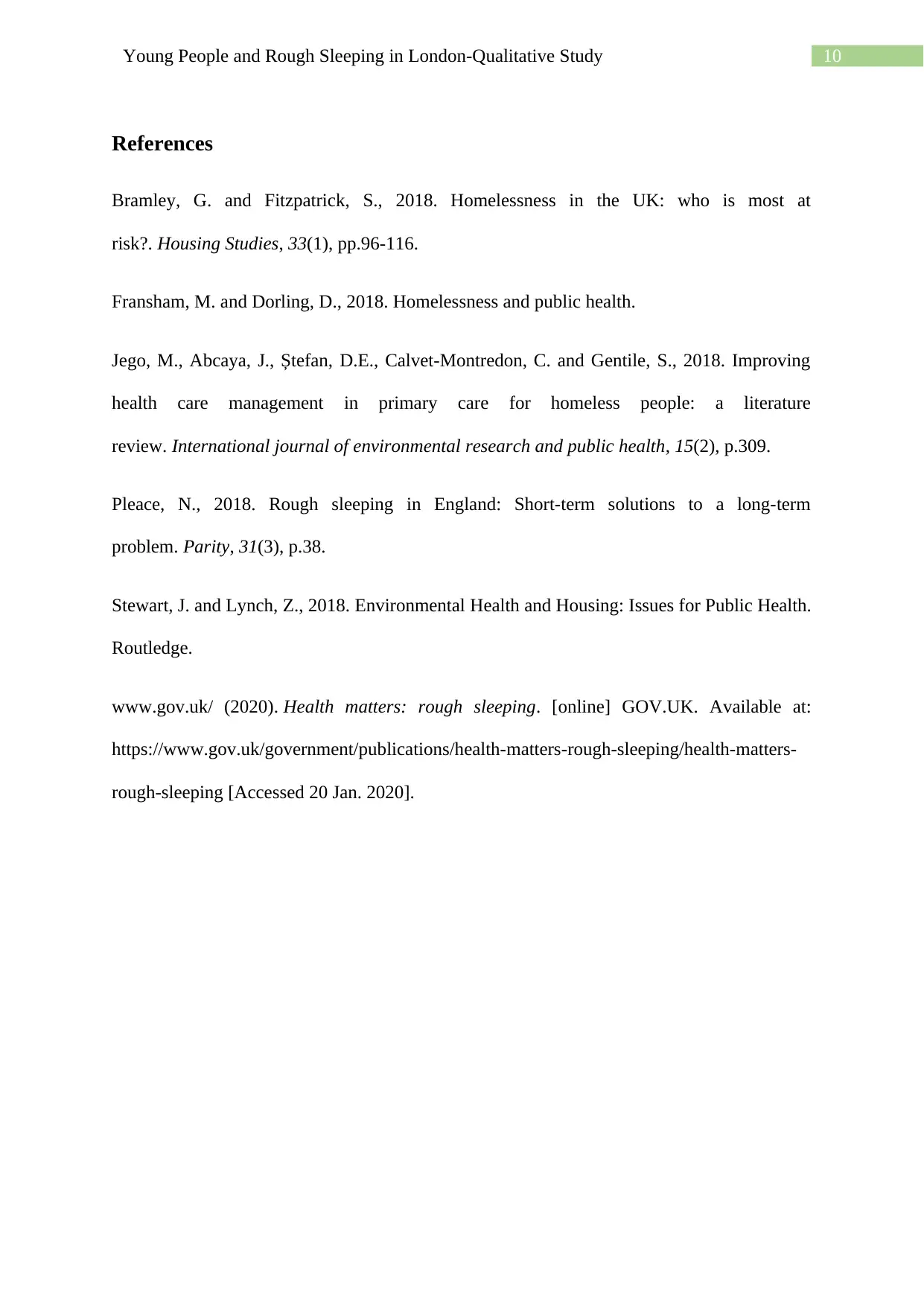
10Young People and Rough Sleeping in London-Qualitative Study
References
Bramley, G. and Fitzpatrick, S., 2018. Homelessness in the UK: who is most at
risk?. Housing Studies, 33(1), pp.96-116.
Fransham, M. and Dorling, D., 2018. Homelessness and public health.
Jego, M., Abcaya, J., Ștefan, D.E., Calvet-Montredon, C. and Gentile, S., 2018. Improving
health care management in primary care for homeless people: a literature
review. International journal of environmental research and public health, 15(2), p.309.
Pleace, N., 2018. Rough sleeping in England: Short-term solutions to a long-term
problem. Parity, 31(3), p.38.
Stewart, J. and Lynch, Z., 2018. Environmental Health and Housing: Issues for Public Health.
Routledge.
www.gov.uk/ (2020). Health matters: rough sleeping. [online] GOV.UK. Available at:
https://www.gov.uk/government/publications/health-matters-rough-sleeping/health-matters-
rough-sleeping [Accessed 20 Jan. 2020].
References
Bramley, G. and Fitzpatrick, S., 2018. Homelessness in the UK: who is most at
risk?. Housing Studies, 33(1), pp.96-116.
Fransham, M. and Dorling, D., 2018. Homelessness and public health.
Jego, M., Abcaya, J., Ștefan, D.E., Calvet-Montredon, C. and Gentile, S., 2018. Improving
health care management in primary care for homeless people: a literature
review. International journal of environmental research and public health, 15(2), p.309.
Pleace, N., 2018. Rough sleeping in England: Short-term solutions to a long-term
problem. Parity, 31(3), p.38.
Stewart, J. and Lynch, Z., 2018. Environmental Health and Housing: Issues for Public Health.
Routledge.
www.gov.uk/ (2020). Health matters: rough sleeping. [online] GOV.UK. Available at:
https://www.gov.uk/government/publications/health-matters-rough-sleeping/health-matters-
rough-sleeping [Accessed 20 Jan. 2020].
1 out of 11
Related Documents
Your All-in-One AI-Powered Toolkit for Academic Success.
+13062052269
info@desklib.com
Available 24*7 on WhatsApp / Email
![[object Object]](/_next/static/media/star-bottom.7253800d.svg)
Unlock your academic potential
Copyright © 2020–2026 A2Z Services. All Rights Reserved. Developed and managed by ZUCOL.





